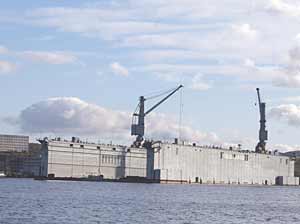
Working to discern patterns of environmental disinformation in an online world
For the past eight years, disinformation has dominated news around elections all over the world. Despite this, it is still a widely misunderstood con...
News

Publish date: March 6, 2003
Written by: Igor Kudrik
News
A Sierra I attack class submarine, K-336, or Pskov, suffered a fire on March 5th. The submarine was in the dry dock at Roslyakovo shipyard, situated between the city of Murmansk and Severomorsk, the home base of the Northern Fleet, on the Kola Peninsula.
Fire crews called to the shipyard managed to put the fire out in one and half hours, Russian news agency ITAR-TASS reported.
The cause of the fire is still unknown, but it may be possible that the welding works ignited the wood scaffolding surrounding the submarine.
No causalities or radiation discharge are reported, although the rubber coating of the submarine is damaged.A similar incident took place in October last year when an Echo II submarine was undergoing decommissioning at Sevmorput shipyard, located in the north of Murmansk. The fire also started on the wood scaffolding in the dry dock surrounding the submarine, and then spread to the rubber coating of the submarine.
The Soviet Union built four Sierra I class attack class submarines, or SSNs. The fifth submarine, which would be a Sierra II class, was decommissioned at the staples in 1993. The Pskov, which entered service in 1993, is the newest nuclear-powered Sierra I class submarine. The first Sierra class submarine, K-239, retired from service in 1998. The two remaining submarines allegedly remain in service. Sierra class submarines are equipped with one PWR reactor and titanium hull.

For the past eight years, disinformation has dominated news around elections all over the world. Despite this, it is still a widely misunderstood con...

A ruling by the European Free Trade Association Court that Norway’s continental shelf falls under the European Economic Area Agreement could dramatic...

Bellona held a seminar on countering Russian disinformation in the Arctic at the Arctic Frontiers international conference in Norway

Our December Nuclear Digest, reported by Bellona’s Environmental Transparency Center, is out now. Here’s a quick taste of three nuclear issues arisin...